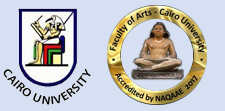عنوان المقال عربي
الهجرة العائدة وإعادة تشكيل الثقافة الإنجابية: دراسة ميدانية للعائدين من مجتمعات غربية
Document Type
Book Review
Keywords English
return migration, Reproductive culture, fertility
كلمات مفتاحية عربي
الهجرة العائدة, ثقافة الإنجاب, الخصوبة
Abstract English
The study aimed to explore the interrelationship between return migration and fertility as one of the natural growth factors of the population, by exploring the reproductive culture of returnees from Western societies, and the extent of their contributions to the restructuring of the original culture of the study society. Therefore, the study raised several questions about the kind of reproductive culture of the original home of returning migrants, the extent to which they have acquired new reproductive culture in countries of migration, or transfer the original culture of the receiving country during the migration period, the study also asked a question about the returnees' contributions to the dissemination of the reproductive culture that had brought to their relatives, friends and neighbors, and thus restructuring the original reproductive culture. The study relied on perspective of cultural diffusion, social adaptation and the theory of practice of P. Bourdieu as theoretical evidence, the study used the case study method and an in-depth semi-structured interview as a data collection tool. The study has been applied on purposely selected sample of ten cases of couples returning from the countries of Europe and the United States of America and residing in Minya governorate in Upper Egypt at the time of the study, the general results revealed that there are many signs that confirm the existence of reproductive culture that encourages the increase of reproduction in society, including traditions, norms and values that support early marriage, female genital mutilation, male preference, early childbearing immediately after marriage, non-use of family planning methods for men, and not only having two children. The analysis also showed that the study sample was exposed to a new reproductive culture that encourages fertility control during the period of residence, such as delaying the age of marriage, not having a children directly after marriage, gender equality in childbearing, against female circumcision, use family planning methods men for, and only having one or two children at most. As a result of this, immigrants have returned to their home country in that culture, as well as their attempts to spread and transfer to those around them, despite the objection of obstacles of cultural legacies, the relatives were more than affected and received, and then friends and neighbors.
الملخص العربي
استهدفت الدراسة محاولة استكشاف العلاقة المتشابكة بين الهجرة العائدة والخصوبة كأحد عاملي الزيادة الطبيعية للسكان، وذلك من خلال استكشاف ملامح ثقافة الإنجاب لدى العائدين من مجتمعات غربية، ومدى إسهاماتهم في إعادة تشكيل الثقافة الأصلية بمجتمع الدراسة. ولهذا طرحت الدراسة عدة تساؤلات حول طبيعة الثقافة الإنجابية للموطن الأصلي للمهاجرين العائدين، ومدى اكتساب هؤلاء لثقافة إنجابية جديدة في بلدان المهجر، أو نقل الثقافة الأصلية للمجتمع المتلقي أثناء فترة الهجرة، كما تساءلت الدراسة حول إسهامات العائدين في نشر ثقافة الإنجاب التي عادوا بها لدى جماعات الأقارب والأصدقاء والجيرة، ومن ثم إعادة تشكيل الثقافة الإنجابية الأصلية. اتخذت الدراسة من منظور الانتشار الثقافي، والتكيف الاجتماعي، والممارسة "لبورديو" موجهًا نظريًا، كما اعتمدت على منهج دراسة الحالة، ودليل مقابلة متعمقة شبه مقنن كأداة لجمع البيانات. وطُبقت الدراسة على عينة قصدية قوامها عشر حالات من الأزواج العائدين من بلدان أوروبا والولايات المتحدة الأمريكية ويقيمون بمحافظة المنيا بصعيد مصر وقت إجراء الدراسة، وقد كشفت النتائج العامة عن وجود الكثير من الدلائل التي تؤكد بقاء الثقافة الإنجابية المشجعة لزيادة الإنجاب بالمجتمع، بما تتضمنه من عادات وتقاليد وقيم تؤيد الزواج المبكر، وختان الإناث، وتفضيل إنجاب الذكور، والإنجاب المباشر للزواج، وعدم استخدام وسائل تنظيم الأسرة للأزواج، وعدم الاكتفاء بطفلين. كما أشارت التحليلات المتعمقة لتعرض واكتساب عينة الدراسة لثقافة إنجاب جديدة تشجع على ضبط الخصوبة أثناء فترة الإقامة، كان من سماتها تأخير سن الزواج، وعدم الإنجاب المباشر للزواج، والمساواة في النوع عند الإنجاب، ومناهضة ختان الإناث، واستخدام الأزواج لوسائل تنظيم الأسرة، والاكتفاء بطفل أو اثنين على الأكثر. وقد ترتب على ما سبق أن عاد المهاجرون للموطن الأصلي بتلك الثقافة، فضلاً عن محاولاتهم في نشرها ونقلها لمن حولهم، ورغم مواجهة عقبات الموروثات الثقافية، كان الأقارب هم أكثر من تأثروا ببعضها، يليهم الأصدقاء فالجيران.
Recommended Citation
Hindi, Abdul Majeed Ahmed
(2019)
"Return Migration and Restructuring of Reproductive Culture: A Field Study of Returnees
From Western Societies,"
Journal of the Faculty of Arts (JFA): Vol. 79:
Iss.
2, Article 3.
DOI: https://doi.org/10.21608/jarts.2019.81628
Digital Object Identifier (DOI)
10.21608/jarts.2019.81628
Accept Date
2018-04-11
Publication Date
4-1-2019

